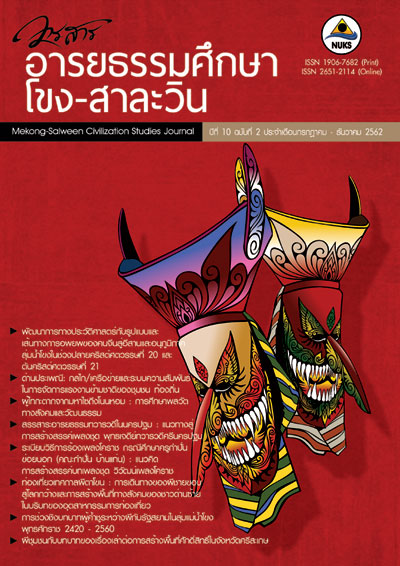Traditional Customs: Mechanism/Network and Relationship System in Managing Transnational Workers of Local Communities Traditional Customs: Mechanism/Network and Relationship System in Managing Transnational Workers of Local Communities
Main Article Content
Abstract
This research aimed to examine the development and process of managing traditional customs by local communities. It also investigated the mechanism for managing transnational migrant workers of local communities in traditional customs. The qualitative data were collected through the interview and group discussion. The scope of the study was limited in the province of Mukdahan, northeastern Thailand.
The study shows that traditional customs are a natural channel through which Thai and Lao peoples travel regularly to visit their relatives. Since the government reform from 1975-1989, the Lao People's Democratic Republic saw tremendous changes in its regime. People crossing the Mekong River are filled with fear due to stricter immigration control. In 1987, Thailand had the policy of turning the battlefield into the trade centre, which promoted the border economy and improved relationship between Thailand and Laos through the traditional customs. It was later referred to as the boating hub where the government allowed boat docking for such purposes as visiting relatives, receiving medical treatment, and purchasing certain goods. For these purposes of boat docking, many government agencies stepped in to administer the boat docking hub or the traditional customs and control over the border area. Such administrations are mainly based on relationship system, negotiation, flexibility, and interdependence as relatives. The influx of people, capitals, and workers in the area are beyond control by border regulations. Such trends result in misconduct of the regulations and unclear practice. In the meantime, the traditional customs have still played a crucial role in the regional economy, society and culture, which people in both banks of Mekong, are interdependent. The networking mechanism of the traditional customs is thus considered a societal benefit for Thai and Lao peoples to use the border area to foster their relationship. This mechanism also leads to the management of traditional customs through the process of community control to establish the management system based on the cultural dimension of border control.
Downloads
Article Details
References
Archavanitkul, K. (2003). The Status of migrant worker’s in Thailand and Research direction for consider, The Institute for Population and Social Research, Mahidol University, Nakorn Phathom.
Boonprakarn, K., et al, (2014). “Border” “Ethnicity” “Traditional Custom” : To Escape the Power of State in Thai-Burmese Borderland. In The APSA 2014 conference “TRANSFORMING SOCIETIES: CONTESTATIONS AND CONVERGENCES IN ASIA AND THE PACIFIC”, 15-16 February 2014. (1-2). Chiang Mai, Thailand: Regional Center for Social Science and Sustainable Development (RCSD)Faculty of Social Sciences.
Mattariganond, D. (2012). Lao history in various dimensions. Muangboran, Bangkok.
Karnchana, P. and Saisothorn, J. Cross Border between Thailand and neighborhood. Retrieved on 26 December, from : http://www.gotoknow.org/blogs/posts/23316017.
Khaeso, A. (2010). Thailand-Laos Economic Relations A.D. 1975-2005 (in Thai), Dissertation, M.A. (Historical Studies), Bangkok, Silapakorn University.
Nunkhantee, A. (2017, January). Tradition Customs : Social and Economy relation of YO community along Mekong river. Journal of The way Human Society. 5 (1) : 272-293.
Sangkhamanee, J. (2008). Border Studies and Anthropology borderlands : Open Space, boundary construction and cross border of knowledge in knowledge Cross border of Thai Social Science 60 years Anan Ganjanapan, ChiangMai University, Chiangmai.
Santasombat, Y. and et al (2012). Border and Cross Border. ChiangMai : The regional center for Social Sciences and Sustainable Development
Srihabun, K. (2009, January). Thai-Laos Relationship in history Book. Journal of Liberal Art . Special Volume : 248-249.
Srihabun, K. (2009, January). Thai-Laos Relationship in history Book. Journal of Liberal Art . Special Volume : 248-249.


